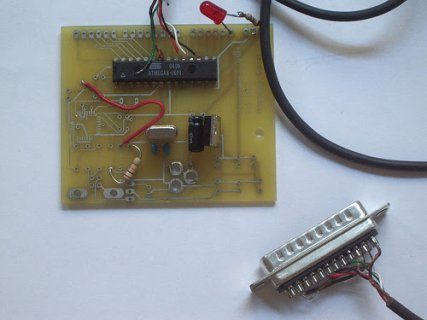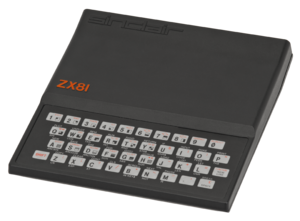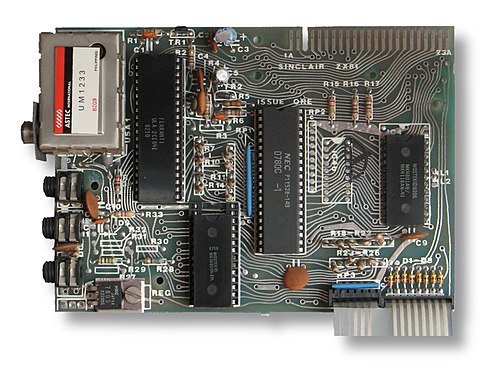You are using an out of date browser. It may not display this or other websites correctly.
You should upgrade or use an alternative browser.
You should upgrade or use an alternative browser.
The Untold History of Arduino
- Thread starter Frank B
- Start date
- Status
- Not open for further replies.
Wozzy
Well-known member
I posted this on G+ some time ago. I can't verify it's authenticity.
ARDUINO PROTOTYPE # 0
I stumbled across this in the Arduino Forums; from a 2008 post by Massimo Banzi.
"For the ones who are into history , this is arduino prototype 0"
Here's a link to the forum post: http://forum.arduino.cc/index.php?topic=22737.msg171840#msg17184

ARDUINO PROTOTYPE # 0
I stumbled across this in the Arduino Forums; from a 2008 post by Massimo Banzi.
"For the ones who are into history , this is arduino prototype 0"
Here's a link to the forum post: http://forum.arduino.cc/index.php?topic=22737.msg171840#msg17184

"Prototype"..that's a std AVR. They existed long time before Arduino and were build by thousands of people 
Hmm... that time i built some Arduino-prototypes, too Maybe before Banzi built his .. .)
Maybe before Banzi built his .. .)
If i remember correctly, mine had a 2313 (NOT the newer tiny2313) (that time, a "Mega" did not exist, i think..)
That parallel-connector was a "ISP" programmer-cable, the cheapest/simplest programmer for the parallel-port and was widely used. "Ponyprog" had a schematic in its documentation.
Hmm... that time i built some Arduino-prototypes, too
If i remember correctly, mine had a 2313 (NOT the newer tiny2313) (that time, a "Mega" did not exist, i think..)
That parallel-connector was a "ISP" programmer-cable, the cheapest/simplest programmer for the parallel-port and was widely used. "Ponyprog" had a schematic in its documentation.
Last edited:
One of my oldest *useful* projects was a clock with russian nixie-tubes. There was a generator for 9V -> 110 Volt which was "regulated" with the 2313-builtin-comparator with software-controlled PWM
A friend with a oscilloscope said it was "terrible", but ok, it worked.. and *still* works today
The Arduino-folks does not mention too, that the AVR-GCC was years old before they started using it..
Last edited:
KurtE
Senior Member+
I had not built any of my own by then, but used a few other AVR processors by then, like:
BDMicro: I think something like - http://www.bdmicro.com/mavric-iib/
Seattle Robotics Society Workshop robot: I think it had an atmega32 (maybe 16) on it.
Not counting earlier computers like Franklin Ace or Amiga...
BDMicro: I think something like - http://www.bdmicro.com/mavric-iib/
Seattle Robotics Society Workshop robot: I think it had an atmega32 (maybe 16) on it.
Not counting earlier computers like Franklin Ace or Amiga...
defragster
Senior Member+
Interesting how 'history is written ...'
Linked through that to this :: http://wiring.org.co/about.html >> and noticed the first name below in a list of almost 3 dozen Contributors . . . and it doesn't seem to be alphabetic and this name is as at the top?
Amazing how the pre-cursor 'open' thesis work of Hernando Barragan seems discounted in history after the advisor forked it and picked a cheaper processor and gave it a name:
And I missed this:
Linked through that to this :: http://wiring.org.co/about.html >> and noticed the first name below in a list of almost 3 dozen Contributors . . . and it doesn't seem to be alphabetic and this name is as at the top?
People
The Wiring team is composed of Hernando Barragán, Brett Hagman and Alexander Brevig.
Hernando started Wiring in Summer 2003 and he has been developing it since. Wiring builds on Processing, the open source programming language developed at the Massachusetts Institute of Technology Media Lab and Interaction Design Institute Ivrea by Ben Fry and Casey Reas.
A number of people have been making additional contributions to Processing and Wiring. The current state of the project wouldn't have been possible without this assistance.
Hernando Barragán
http://barraganstudio.com
Brett Hagman
http://roguerobotics.com
Alexander Brevig
http://alexanderbrevig.com
Contributors:
Paul Stoffregen http://www.pjrc.com
....
Amazing how the pre-cursor 'open' thesis work of Hernando Barragan seems discounted in history after the advisor forked it and picked a cheaper processor and gave it a name:
History :: https://en.wikipedia.org/wiki/Arduino#History
Colombian student Hernando Barragán created the development platform Wiring as his Master's thesis project in 2004 at the Interaction Design Institute Ivrea (IDII) in Ivrea, Italy. Massimo Banzi and Casey Reas (known for his work on Processing) were supervisors for his thesis. The goal was to create low cost, simple tools for non-engineers to create digital projects. The Wiring platform consisted of a hardware PCB with an ATmega168 microcontroller, an IDE based on Processing and library functions to easily program the microcontroller.[35]
And I missed this:
blog.arduino.cc/2016/10/01/two-arduinos-become-one-2/Joining of the two Arduino's
At the World Maker Faire in New York on October 1, 2016, Arduino LLC co-founder Massimo Banzi and Arduino SRL CEO Federico Musto announced that the 2 Arduino companies will join and become one.[
MichaelMeissner
Senior Member+
Hopefully Paul will find the merged Arduino easy to work with (my sense is Arduino SRL contributed very little to the software, but of course any change can be problematical). Hopefully, they will still produce open source support through the Arduino Foundation (and it isn't just an attempt to throw it off and let it sink or swim on its own).
Michael Ward
Active member
My understanding is that the .org version is far behind the .cc version. Opinions seem to be landing on it going away in favor of cc's. We'll see.
--Michael
--Michael
Hackaday published a short summary a few months back; http://hackaday.com/2016/03/04/wiring-was-arduino-before-arduino/
Soundbytes
Member
I read Making things talk a couple of years ago and here the focus is very much on Wiring. It was a bit strange because that was a very unfamiliar name to me then. Hernandez Article is a sad read but clears things up quite a bit.
- Status
- Not open for further replies.



